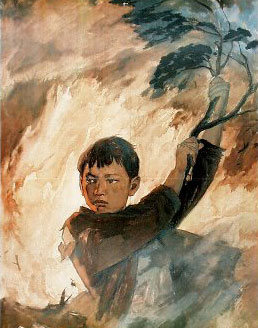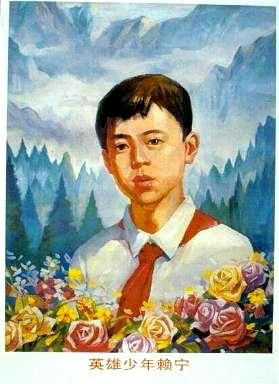A dozen years ago, Chinese teenagers were besieged in a nation-wide wave to
learn from a late juvenile hero, Lai Ning (1974-1988). The native of the
southwestern province of Sichuan died trying to put out a forest fire when he
was only 14 years old.

Lai Ning.
[google.com] |
In November 1988, Lai was named a 'revolutionary martyr' and held up as an
example for other teenagers to follow.
However, in today's China, Lai has been replaced by stylish pop stars from
Taiwan or Hong Kong, such as Jay Chou and S.H.E (A three-member pop music group
comprised of Taiwanese native Selina Ren, Hebe Tian and Ella Chen), in teenagers
minds, and people are struggling to find an answer to whether it's right or not.
Terms in China's Conduct Code of Pupils, such as 'Do not be scared to fight'
and 'Try to save others in danger' have been replaced by 'Reporting the danger
to others' and 'Learning to protect oneself.'
What's more, China's Ministry of Education discourages teenage heroism in the
Measures for Primary School, Middle School and Kindergartens on safety
management, which came to effect September 1, saying schools are not allowed to
deploy under-age students for emergency rescue work.
Only specialists and adults are encouraged to make emergency rescue efforts,
the circular says.
"The change demonstrates China's progress on the perspective on the teenage
heroism," experts told the chinanews.cn.
"To protect teenagers, the Chinese government should not encourage under-aged
youths to help others out of emergencies and glorify teenage heroism."
Saving an individual's life is a great thing. But life of the rescuer is just
as valuable as the life in danger. Human virtue should not encourage uncertain
rescue efforts, says a comment carried by the China Youth Daily.

Lai Ning.
[google.com] |
The comment stresses that most of the rescue work involving teenagers ends in
tragedy.
For Chinese parents, who are confined to having a "little emperor" or "little
princess" by China's one-child policy have become advocates of the latest move
in a 5,000-year-old country, which is deeply affected by Confucius' theories on
kindness and sacrifice.
Nine per cent of respondents of a poll conducted by the Sichuan Online agree
that when their children are in an emergency situation, the most important thing
is to protect themselves and be prepared to turn to others for help.
Don't use the egg to hit the stone and never demonstrate one's courage in an
emergency aptly describes the attitudes of some parents polled towards teenage
heroism.
"Teenagers are good at imitation and the powers of example are great. There
may be lots of mishaps if the government encourages this," a respondent Zhang
Mingliang says.
"Not rushing to save others is a good way to think," the China Youth Daily
concludes.